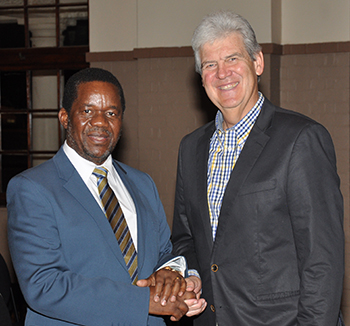 Prof Bongani Majola and Prof Leon Wessels at
Prof Bongani Majola and Prof Leon Wessels at
the launch of the FSHRC.
Photo: Supplied
Human rights are part of the dominant moral and political language of our time, and demand a multi-layered scholarly engagement. These discussions influence national and international relations, and set standards for political and democratic practice.
New Centre for Human Rights launched
Since the academic space is a microcosm of society at large, it is crucial that the University of the Free State (UFS) takes part in such scholarly discussions, drawing lessons and crafting solutions from these dialogues.
To this end, the new Free State Centre for Human Rights (FSCHR) was officially launched on 14 March 2017 at the Bloemfontein Campus of the UFS. Professor Bongani Majola, the newly elected chairperson of the South African Human Rights Commission (SAHRC), was the guest speaker at the event. The FSCHR began operating on 1 January 2016, under the leadership of Prof Leon Wessels, founding member of the SAHRC, as the acting director of the centre.
A priority on the centre’s agenda will be to uphold the February 2011 post-Reitz agreement between the SAHRC and UFS, which was subsequently made an order of the Equality Court. This order compelled the UFS to establish such a centre. The centre presents new opportunities for cooperation between the UFS and SAHRC and other stakeholders to benefit the UFS and the broader community.
Anti-Racism Week marked by IRSJ
The Institute for Reconciliation and Social Justice (IRSJ), in conjunction with the newly-launched FSCHR, the Anti-Racism Network of South Africa (ARNSA), and the Arts and Culture office of Student Affairs presented an event on Friday 17 March 2017 to mark Anti-Racism Week (14-21 March) and Human Rights Day (21 March).
This second annual Anti-Racism Week sees seven days observed for all institutions, organisations, and individuals to fight racism, with each day having an assigned theme, such as ‘Be Aware’ (14 March) and ‘BeCome’ (21 March).
“Battling racism
is a life-long
commitment”
—JC van der Merwe,
Acting Director, IRSJ
JC van der Merwe, Acting Director of the IRSJ, said, “Battling racism is a life-long commitment. It is time for us to tackle the problem head-on. Anti-Racism Week gives us the platform to communicate within the university, within our communities, but also at grassroots level. The idea this year is that we all BeCome champions against racism, not just during this week, but that it will become part of everyday life on our campuses.”
Talented UFS students perform a flash mob dance prior to a collaborative event to mark Anti-Racism Week and Human Rights Day.
Video: UFS Instagram